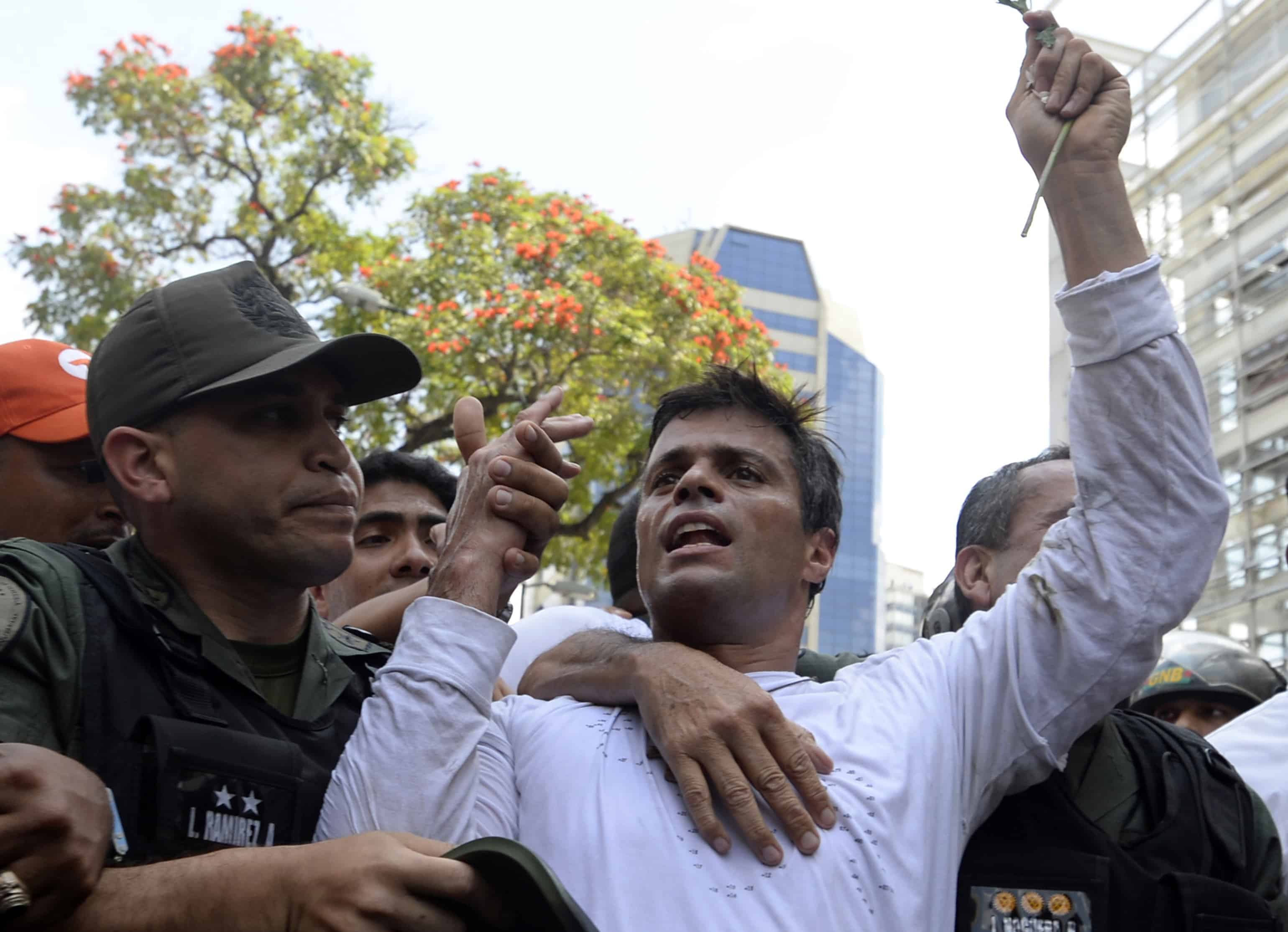CARACAS, Venezuela – Fugitive Venezuelan opposition leader Leopoldo López calmly turned himself in to authorities Tuesday at a tumultuous rally in Caracas as his followers shouted “Freedom! Freedom!”
The government of President Nicolás Maduro had banned the opposition march after López said he would use it to surrender, ringing the plaza with police and national guard anti-riot troops.
The surrender marked a dramatic inflection point after two tension-filled weeks of protests in the oil-rich country, led by students angry over rampant crime, deteriorating living conditions and jailings of demonstrators.
Maduro last week ordered López’s arrest on charges of homicide and inciting violence after violent street clashes in Caracas left three dead.
Defying a ban, thousands of López’s supporters turned out dressed in white at the Plaza Brión after he called the march in a video message on Sunday, pledging to turn himself in if the government sought to arrest him.
López, also in white, suddenly emerged in the crowd, climbing a statue of Cuban independence hero José Martí with a Venezuelan flag. After delivering a brief message to his cheering supporters, he surrendered to the National Guard.
“I present myself before an unjust justice, before a corrupt justice,” said the 42-year-old Harvard-educated economist.
“If my incarceration serves to wake up a people, … my infamous incarceration will have been worth it,” he said to an explosion of cheers from the crowd.
He calmly walked under escort to a National Guard vehicle as his supporters pressed in around the vehicle, blocking its path.
Shouts of “Freedom, Freedom!” and “It’s going to fall, it’s going to fall, this corrupt government is going to fall” rose from the crowd.
López himself got on the loudspeaker from within the vehicle to appeal for calm.
Three rings of National Police backed by a second line of National Guard anti-riot troops with light armored vehicles were positioned around the plaza.
Meanwhile, the government summoned its followers to rallies of its own in an area of downtown Caracas where the opposition march was to end, raising the risk of a violent confrontation.
‘They will not pass’
“Not one single opposition march is going to enter the territory of Libertador municipality,” said National Assembly President Diosdado Cabello, referring to the city’s western downtown district, where the opposition march was to end.
“They will not pass. It is not authorized,” Cabello said late Monday on his new nightly television program.
The opposition protesters turned out anyway. Some carried signs that read: “24,763 violent deaths in 2013. We are more than a statistic.”
“We are expressing the frustration we feel. The country is in chaos, there are no supplies in the hospitals, we are sick of the insecurity. I want a Venezuela of progress,” said Satle Oviedo, a 27-year-old hospital worker.
Under the slogan “the exit,” López and other opposition leaders have pushed for anti-government street protests to force a “constitutional change.”
There is no provision for recall elections until April 2016, and Maduro, who was elected in April 2013, has said he will never resign.
The confrontational approach has aroused misgivings within the opposition coalition formed in 2012 to defeat the late Hugo Chávez.
But Henrique Capriles, the two-time opposition presidential candidate and governor of the state of Miranda, said he would take part in Tuesday’s march even though he does not think the time is ripe to try to force the government from power.
“We may have differences but we feel solidarity,” Capriles said.
Tense U.S.-Venezuela ties
The tensions generated by the protests have spilled into the international arena as well.
On Sunday, Maduro ordered the expulsion of three U.S. diplomats, accusing them of meeting with student leaders under the guise of offering them visas.
State Department spokeswoman Jen Psaki, confirming the expulsion orders, said Tuesday the United States was considering what actions it will take.
“We have seen many times that the Venezuelan government tries to distract from its own actions by blaming the United States or other members of the international community for events inside Venezuela,” she said.
“These efforts reflect a lack of seriousness on the part of the Venezuelan government to deal with the grave situation it faces,” she said.
Venezuela’s relations with Washington, long strained under Chávez, have remained sour and distrustful under Maduro, who has hewed closely to his predecessor’s socialist policies.
In late September, Maduro kicked out three other U.S. diplomats, on accusations of conspiring with government opponents. The two countries have had no ambassadors since 2010.
Various Latin American leaders closed ranks behind Maduro, while regional organizations like Celac, Unasur and countries like Mexico and Panama urged Venezuelans to resolve their differences through dialogue.
The secretary general of the Organization of American States, José Miguel Insulza, called on all sides to refrain from violence, warning it would further polarize “the delicate political moment that the South American country is living.”






